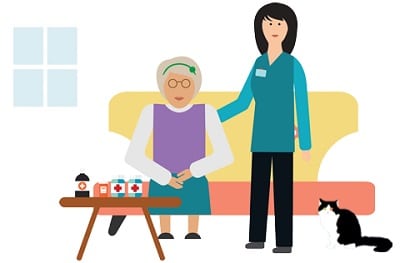by: James Fleming
If you are a family caregiver, you may be supplementing your caregiving responsibilities with an in-home care attendant for your aging parent. In-home care attendants offer assistance helping with everything from activities of daily living like dressing and eating to instrumental tasks like checking mail, refilling prescriptions, and arranging transportation.
They also uniquely provide companionship, emotional support, and mental stimulation that can help older adults feel more engaged and purposeful in life. Once you have come to a joint decision on a home care agency or home care worker, it’s time to prepare for their arrival.
If you’re initiating home care services for your loved one, keep these simple preparation tips in mind:
Discuss your parent’s need with your parent: You may know all the caregiving tasks your loved one requires of you on a regular basis, however, have you stopped to ask them if there is anything else they need help with that they haven’t mentioned. What are the barriers keeping your loved one from living their ideal life? Perhaps there is something more a home care attendant can help with that you were not yet clued in on because your parent didn’t want to burden you.
Print and post a medicine schedule. If your new home care attendant is assisting with medication refills or making sure your loved one takes their medicine on time, it is critical that you have a clearly posted medicine schedule for them to reference. Remember to include the name of the medication, the dosage and frequency at which it is taken, any adverse side effects to watch out for, and the prescribing doctor’s contact information.
Set your loved one up for success. In-home care can be a tool of empowerment that actually helps your loved one build confidence and self-reliance as they can see to more daily activities and tasks. Set them up for success by equipping them with ease-of-use tools like reacher grabbers and dressing aids, adaptive utensils to simplify preparing food and eating, and mobility aids as needed for getting out for walks or exercise.
Set up remote monitoring. If you are interested in seeing how your loved one gets on during the day with their new home care attendant, consider setting up remote monitoring. Many baby monitors these days come with mobile app syncing so you can safely check on your loved one from the convenience of your smartphone. You may also request a live video chat via Skype or Facetime during the day with your loved one and their home care attendant too.
Share the schedule. A daily routine can provide structure and stability for older adults, especially if they have mild cognitive impairment or medical needs (i.e. taking medicine, checking blood sugar levels, etc). Share your parent’s typical schedule with the new home care attendant and even consider posting it so they can stay on track. It can also help your loved one feel more familiar with their day even though a new person is in their home helping them out.
Let them in on the nuances. While your home care attendant will get to know your loved one and form their own relationship with them, you know them best and sharing little details that could help your loved one feel more at ease with a new person is good. Perhaps there is a story your loved one enjoys telling, or a pillow they like to sit with while they watch TV, or a friend they like to call after lunch.
Make necessary home upgrades. If your home care attendant is helping your loved one get up, get dressed, use the bathroom, or take a shower, your home may be in need of some quick, easy upgrades. Installing rails on the bed and grab bars by the toilet and shower will simplify these tasks for your home care attendant as well as make the whole process safer for your loved one.
Suggest meal ideas. If you have not prepared meals to be reheated by your home care attendant, you may instead want to list off available items in the house for eating as well as what your loved one likes to eat for breakfast, lunch, and/or dinner. If your parent puts up a bit of a fight regarding food with their home care worker, they’ll be able to say too that they spoke with you and they know that your parent loves peanut butter and honey sandwiches, for example.
Set expectations. Be ready to set expectations for your home care worker about not just what your loved one needs help with, but what you expect as far as punctuality, phone use while on the job, basic cooking and housework skills, and communication with you while they are with your loved one.